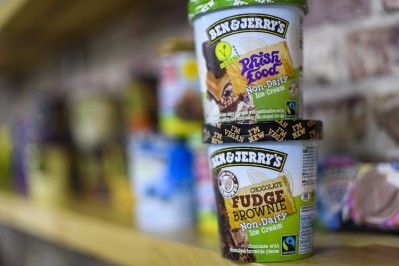Unilever ‘100% committed’ to nutrition and ice cream businesses

The consumer goods giant was thwarted in its discussions to take control of the healthcare division of GSK, which it described as a ‘strong strategic fit’ that would expand footprint in health, beauty and hygiene. These categories offer ‘higher rates of sustainable market growth’, the company said at the time, ‘with significant opportunities to drive growth through investment and innovation, and by leveraging Unilever’s strong presence in emerging markets’. The deal would have been funded through the disposal – or potential IPO – of Unilever’s food businesses, which include brands like Hellmann’s and Magnum.
Speaking yesterday on a conference call to discuss Unilever’s full-year results, CEO Alan Jope revealed that management has put a pin in any vision of transformative portfolio adjustment. “We've listened carefully to our shareholders, and we've heard the message that there's currently no support for a move the size of the GSK Consumer Health business,” he noted. “We remain resolved in the direction of our portfolio evolution, but we will not be proposing transformational acquisitions for the foreseeable future. They are off our agenda.”
Since the failed M&A drive, Unilever has reorganised its business into five operating units: beauty & wellbeing, personal care, home care, nutrition, and ice cream. Jope insisted that the new structure does not pave the way to a sell-off of either the nutrition or ice cream business units. “We've been asked whether the new business groupings are the next step for a disposal of the nutrition or ice cream businesses. Let me be clear, both nutrition and ice cream are great businesses with strong brands that can thrive within Unilever. Both have benefited from our focus on operational excellence and have performed particularly strongly during the pandemic. And we've already stepped up their growth profile through the divestment of spreads and the Ekaterra tea business.”
Indeed, he suggested that the new operating model will give Unilever’s food brands added impetus to thrive. “The new operating model will give them even more power to drive performance by responding to the consumer and channel dynamics that are unique to each of those business groups. So we see a bright future ahead for both nutrition and ice cream inside Unilever.”
“We've drawn a line under the GSK Consumer Health proposal, and we do not intend to pursue any other major acquisitions in the foreseeable future. We are 100% committed to continue the step-up in growth of our existing businesses through the five new business groups.”
Supporting organic growth in nutrition and ice cream
Jope said that the plan now is to accelerate growth ‘through a rigorous focus on organic growth’ while making ‘incremental portfolio change’ through bolt-on acquisitions ‘predominantly in the higher-growth spaces of beauty and well-being.’
He insisted that ice cream and nutrition ‘have become very attractive businesses’. “In fact, ice cream and nutrition have outperformed the company over the last couple of years. And some of our fastest-growing brands are brands like Knorr growing at 7%, Hellmann's growing at 11%, Magnum growing at 9%, Ben & Jerry's growing at 9%. So these businesses are in good health.
“We do think that they will benefit from the increased focus that they will have from the separation into five business groups because there are different characteristics between an ice cream business and a beauty business. But they all benefit from many of Unilever's skills and capabilities and our deep presence around the world. So we are very confident that those businesses will thrive under Unilever… Any notion of separation was entirely contingent on a transformational acquisition, and that is off the table now.”
Unilever reported its ‘fastest growth in nine years’ yesterday with underlying sales up 4.5% and underlying EPS increasing 5%. However, in the year to come the company is likely to see its margin adjusted downwards to reflect rising input costs and plans to maintain investment levels in marketing and innovation. Indeed, Jope suggested, cost inflation will be the ‘biggest challenge’ for 2022. “We have been leading on pricing, and it's working. We will invest competitively in advertising, in R&D and in operational CapEx. As a result, our margin will be down in 2022,” he revealed.



















